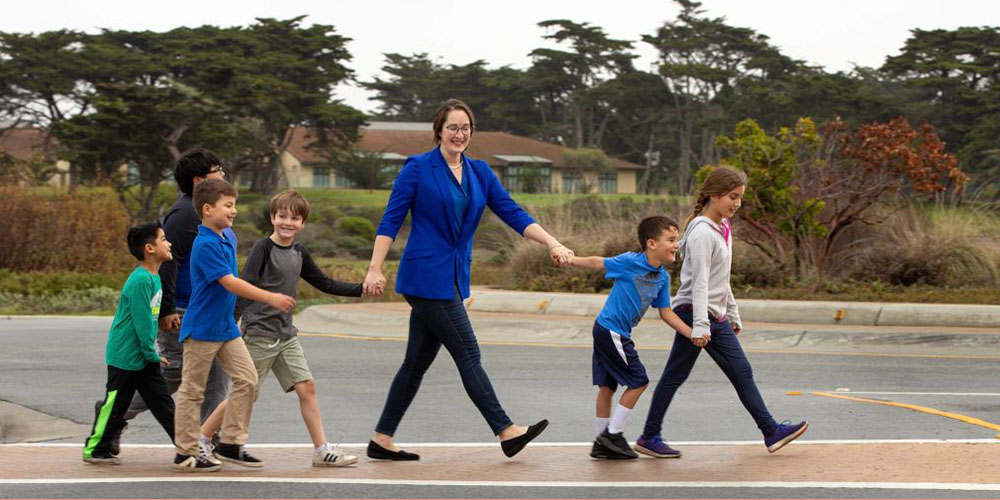
(Photos courtesy of the office of Supervisor Wendy Root Askew)
California Forward is committed to advancing policy intersections that create a more inclusive and sustainable California where all people can prosper. The Voices of Shared Prosperity series amplifies the stories of Californians who are committing their time and talent to solutions that embrace equity, environmental sustainability, and economic opportunity.
A fourth-generation Monterey Bay resident, mother, and wife, County Supervisor Wendy Root Askew never envisioned that she would have a career in politics. While she describes the path that led to her current position as a series of “fortunate accidents,” her lived experience and connection with her community serve as the north star of her journey.
The daughter of an educator and a retired Army colonel, Askew recalls moving 12 times during her childhood, many times as a result of rent increases. Housing affordability is one of many core components that Supervisor Askew has identified as necessary prerequisites to diverse community-based participation and engagement.
| The percent of Monterey County households paying less than 30% of their income on rent was 43% in 2019. Learn more with CA FWD’s California Dream Index. |
|---|
“I will never move again and there is comfort in that,” said Askew. “I don’t have to worry about rent going up. There’s security that allows me to take a risk and run for elected office and I don’t worry that I will have to move out of the district.”
 Underscoring the importance of bringing these types of diverse lived experiences to the position, Askew emphasizes giving voice to those not traditionally represented at the decision-making table by eliminating barriers to participation and adopting solutions that encourage inclusive engagement.
Underscoring the importance of bringing these types of diverse lived experiences to the position, Askew emphasizes giving voice to those not traditionally represented at the decision-making table by eliminating barriers to participation and adopting solutions that encourage inclusive engagement.
Askew also reflected on some of the challenges she faced serving previously on her school district board as a working mom of a young child. She also highlighted some of the challenges many working parents face in serving on the board, explaining they simply couldn’t afford to do it.
“If we really truly want to have elected officials with diverse voices, we have got to look at who can afford to sit around those tables, how do we compensate them for their time and the opportunity cost of taking off from work to sit around those tables.”
While serving her first term as county supervisor during the pandemic has been exceptionally challenging, Askew highlighted that the work has been equally as rewarding. The pandemic has forced policymakers and community leaders to support strategies that meet the needs of people where they are personally and professionally. She relies on her experiences and those of her constituents to form empathetic community-centered recommendations to expand opportunities. Some of her top-level recommendations include:
- Reform compensation and support for elected officers – Typically, it takes a considerable amount of unpaid volunteer time to hold board positions. Askew supports statewide reform in compensation for elected officers to attract more people who might not otherwise be able to participate in these roles. She insisted “we need to be structurally set up to support the voices we say we care about and the voices we say we want around the tables. This includes building child care into public meetings and making remote participation available.”
- Support community-centered policymaking – Askew asserts the importance of prioritizing community as we look to rebuild and strengthen regional and state economies. Referring to the disproportionate impact COVID-19 school closures had on students facing homelessness, she emphasizes that policies must prioritize families and community members who are in the most need. She celebrates the work nonprofits have done in response to the pandemic but asserts that government must do a better job of centering families, caretakers, and communities in policymaking.
- Support community-based programming – Askew shared that Monterey County invested an estimated $4.9 million into the Virus Integrated Distribution of Aid (VIDA) program. The community health worker program was a collaborative effort through 10 nonprofits to train and hire community members as health workers to educate the community about best practices for preventative care against COVID-19 and to provide information for available resources.
- Prioritizing brass-tacks work over performative politics – “We’ve got to be very careful about falling victim to ‘feel-good politics’ and find the ways to keep the focus on structural reforms and the embedded policies that allows everyone to be successful,” Askew shared.
Supervisor Askew supports looking back at the policies and practices that increased access for individuals and communities during the pandemic. She encourages continuing these practices and building off of them to reimagine the future of the state. Her continued focus on education equity, housing affordability and availability, and support for community-centered practices continue to be cornerstones of her work and the lighthouse to a more equitable future.

